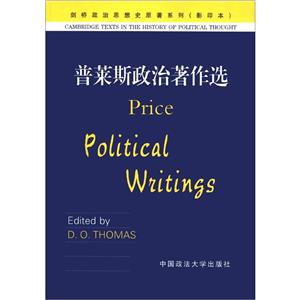预估到手价是按参与促销活动、以最优惠的购买方案计算出的价格(不含优惠券部分),仅供参考,未必等同于实际到手价。
-
>
中共中央在西柏坡
-
>
中国历代政治得失
-
>
中国共产党的一百年
-
>
在庆祝中国共产主义青年团成立100周年大会上的讲话
-
>
中国的民主
-
>
中华人民共和国六十年实录(套装共10册)
-
>
新书)社会主义发展简史(大字本)
汉译名著:职业伦理与公民道德
¥16.0¥29.0王阳明全书(新版)
¥25.8¥68.0至道无餘蕴矣:梁漱溟访谈录
¥33.7¥68.0昏昏灯火话平生-邵燕祥话旧文选
¥30.8¥56.0萌宠爱犬
¥5.9¥22.0
普莱斯政治著作选 版权信息
- ISBN:9787562023777
- 条形码:9787562023777 ; 978-7-5620-2377-7
- 装帧:简裝本
- 册数:暂无
- 重量:暂无
- 所属分类:>>
普莱斯政治著作选 本书特色
Richard Price(1723-91)was an eminent Welsh philosopher and Dissenting min/ster.His political pamphlets won him considerable fame in the eighteenth century as a supporter of the American rebels in their struggle for independence, and for the enthusiasm with which he greeted the opening events of the French Revolution. It was this enthusiasm which provoked Edmund Burke into writing Rejlections on the Revolution in France . Price is noteworthy as a defender of freedom of thought( especially on religious matters), as a proponent of parliamentary reform, and as an advocate of a minimalist conception of govemment. He espoused the doctrine of natural rights and the principle of self-government, namely that every individual capable ofindependent judgement has the right to participate in some measure in the government of his society, and that every community capable of independence has the right to govern itself. This book is a collection of Price's most important pamphlets of the period 1759 - 89, and is accompanied by a comprehensive introduction putting Price's work in context, complete bibliographical material, a chronology, and biographical notes on persons mentioned in the texts.
普莱斯政治著作选 内容简介
本书为剑桥法律思想史原著系列之一,书中收录了普莱斯多篇政治思想史作品。
普莱斯政治著作选 目录
Chronology
Bibliographical note
Brographical notes
A note on the texts
Britain's Happiness, and the Proper Improvement of it Two Tracts on Civil Liberty, the War with America, and the Debts and Finances of the Krngdom
General Introduction
Observations on the Nature of Civil Liberty, the Prinaples of Government, and the fustice and Policy of the War with America
Additional Observations on the Nature and Value of Civil Liberty, and the War with America
A Fast Sermon (1781)
Observations on the Importance of the American
Revolution and the Means of making it a Benefit to the World
The Evidence for a Future Period of Improvement in the State of Mankrnd
A Discourse on the Love of our Country
Index
普莱斯政治著作选 节选
and when he asserts the competence of our legislature to revive the High-Commission Court and Star-Chamber, and its boundless auth-ority not only over the people of Britain, but over distant communities who have no voice in it. But whatever may be Mr. Burke's sentiments on this subject, he cannot possibly tlunk of the former account of govemment that 'it is a speculation which destroys all authority'. Both accounts establish an authority. The difference is that one derives it from the people and makes it a linuted authority; and the other derives it from heaven and makes it unlimited. I have repeatedly declared my admiration ofsuch a constitution of government as our own would be, were the House of Commons a fair representation of the kingdom and under no undue influence. The sumrof all I have meant to maintain is, 'that legitimate government as opposed to oppression and tyranny, consists in the dominion of equal laws made with common concent or of men over themselves and not in the dominion of communities over communi-ties, or of any men over other men'. How then can it be pretended, that I have aimed at destroying all authority? Does our own constitu-tion destroy all authority? Is the authority of equal laws made with common consent no authority? Must there be no government in a state that governs itself? Or, must an institution, contrived by the united counsels of the members of a community for restraining licen- tiousness and gaining security against injury and violence, encourage licentiousness and give to every one a power to commit what outrages he pleases? The Archbishop of York [William Markham] (in a sermon preached before the Society for Propagating the Gospel in Foreign Parts, 21 Feb.1777) has taken notice of some loose opinions, as he calls them, which have been lately current on civil liberty; some who mean delinquency having given accounts ofit 'by which every man's humour is made to be the rule of his obedience, all the bad passions are let loose, and those dear interests abandoned to outrage for the protection of which we trust in law'. It is not difficult to guess at one of the delinquents intended in these words. In opposition to the horrid sentiments ofliberry which they describe, but wluch in reality no man in his senses ever entertained, the Archbishop defines it to be simply the supremacy oflaw, or government by law, without adding to 'law' as I had done, the words 'equal and made with common con-sent'; and without opposing a government by law to a government by men, as others had done. According to him, therefore, the supremacy of law must be liberty, whatever the law is, or whoever makes it. In despotic countries govemment by law is the same wirh govemment by the will of one man, which Hooker has called 'the nusery of all men';but, according to this definition, it is liberty. In England formerly the law consigned to the flames all who denied certain established points of faith. Even now, it subjects to fines, imprisonment and banishment all teachers of religion who have not subscribed the doctrinal articles of the church of England; and the good Archbishop, not thinking the law in tlus case sufficiendy rigorous, has proposed putting Protestant Dissenters under the same restraints with the Papists. And should this be done, if done by law, it will be the establishment ofliberty. The truth is that a government by law,is or is not liberty, just as the laws are just or unjust; and as the body of the people do or do not participate in the power of making them. The leamed prelate seems to have thought orherwise, and therefore has given a defirution of liberty which might as well have been given of slavery. At the conclusion ofhis sermon, the Archbishop adds words which he calls comfortable, addressed to those who had been 'patient in tribulation', and intimating that they might 'rejoice in hope', 'a ray of brightness then appearing after a prospect which had been long dark'. And in an account which follows the sermon, from one of the mis-sionaries in the province of New-York, it is said that, 'the rebellion would undoubtedly be crushed, and that then will be the time for taking steps for the increase of the church in America, by granting it an episcopate'. ……
- >
我从未如此眷恋人间
我从未如此眷恋人间
¥32.4¥49.8 - >
名家带你读鲁迅:朝花夕拾
名家带你读鲁迅:朝花夕拾
¥10.5¥21.0 - >
巴金-再思录
巴金-再思录
¥14.7¥46.0 - >
唐代进士录
唐代进士录
¥15.1¥39.8 - >
【精装绘本】画给孩子的中国神话
【精装绘本】画给孩子的中国神话
¥17.6¥55.0 - >
史学评论
史学评论
¥23.5¥42.0 - >
自卑与超越
自卑与超越
¥12.7¥39.8 - >
有舍有得是人生
有舍有得是人生
¥17.1¥45.0
-
为什么是中国
¥19.6¥58 -
国家社科基金丛书:理解新时代:若干重大理论问题研究
¥47.6¥68 -
1909-1928-民国时期的三民主义-戴季陶思想研究
¥8.1¥29 -
政治分析-政治科学概论
¥17.8¥56 -
大国政府
¥29.3¥39 -
布朗基文选
¥9.5¥17






















